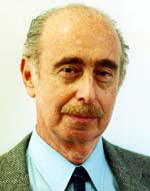In Memoriam: Albert Rubenstein, Professor Emeritus in Industrial Engineering and Management Sciences
Engineering management pioneer founded McCormick’s Master of Engineering Management program
Albert Harold Rubenstein, Walter P. Murphy Professor Emeritus of industrial engineering and management sciences at Northwestern University’s McCormick School of Engineering, passed away April 13. He was 90.
A dedicated academic, adviser, and consultant who spent more than four decades at McCormick, Rubenstein was known for his pioneering work in engineering management, as well as a commitment to bring his field to the forefront at the University.
“Al was a giant in the field of engineering and technology management, and his legacy lives on at Northwestern through the very successful Master of Engineering Management program,” said Barry Nelson, professor and chair of industrial engineering and management sciences at McCormick.
 Understanding that companies need continuous technological innovation along with effective management to maintain a competitive edge, Rubenstein founded the Master in Engineering Management (MEM) program in 1976 to provide high-quality engineering management education for engineers and scientists in the Chicago area. Initiating the program was a challenge — at the time, many faculty members were skeptical of a part-time program to educate working professionals — but Rubenstein persisted, gaining support for one of the first master’s programs in the country to offer collaboration between a management school and an engineering school.
Understanding that companies need continuous technological innovation along with effective management to maintain a competitive edge, Rubenstein founded the Master in Engineering Management (MEM) program in 1976 to provide high-quality engineering management education for engineers and scientists in the Chicago area. Initiating the program was a challenge — at the time, many faculty members were skeptical of a part-time program to educate working professionals — but Rubenstein persisted, gaining support for one of the first master’s programs in the country to offer collaboration between a management school and an engineering school.
Rubenstein directed the MEM program from 1977 until 1992. He also established two research centers at Northwestern, the program on Management of Research, Development, and Innovation (POMRAD) and the Center for Information and Telecommunication Technology.
Outside of his academic life, Rubenstein was founder and president of International Applied Science and Technology Associates (IASTA), a consultancy through which he advised industrial and government organizations in the United States and abroad.
Born in Philadelphia in 1923, Rubenstein described his first experience with engineering principles as a teenager in the early years of World War II. He was working for a beverage and perfumes company when he was tasked with assembling a portable filtration system to be installed on the third floor of a customer’s factory. After delivering the machine, he learned there was a problem.
“[I]t would not fit onto the elevator in the building!” Rubenstein recalled in a 2009 article in Engineering Management Journal, adding that he had been forced to disassemble and reassemble the entire machine. “Thus, I received, at age 16, a valuable lesson in the need for careful system design, planning, and project management in even these simplest of projects.”
Rubenstein’s experience as a combat infantryman in the war further cemented his interests. After the war, he returned to his home state to attend Lehigh University, graduating in 1949 with a degree in industrial engineering. He went on receive MS and PhD degrees in industrial engineering and management from Columbia University.
Rubenstein served on the faculty at MIT’s School of Industrial Management before joining Northwestern’s faculty in 1959. The same year, he was elected editor of the journal Transactions on Engineering Management, a position he would hold for more than 25 years.
Over the course of his career, Rubenstein co-edited Some Theories of Organization, edited Coordination, Control and Financing Industrial Research, and authored nearly 200 articles and books on R&D/technology management. He served as director of studies for the College of Research and Development, was vice-president for research and education of the Institute of Management Sciences, and from 1960 to 1983 was a director of the Narragansett Capital Corporation. He was also a member of the advisory committee on Economic and Manpower Studies of Science and Technology for the National Science Foundation.
After retiring from Northwestern, Rubenstein moved to Washington, D.C. in 2004, where he stayed active in research and consulting.